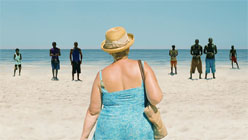The Austrian filmmaker Ulrich Seidl has a discomfiting gift for making the viewer complicit in whatever’s happening onscreen. From his early documentaries to the horrifyingly deadpan suburban portrait Dog Days (2001), from the grimy desperation of Eastern Europeans after communism in Import/Export (2007) to his new Paradise trilogy, each of his films makes us feel that we’re watching private encounters and vulnerable moments no stranger should be privy to. Don’t imagine that Seidl’s films traffic in the shallow but undeniable pleasures of voyeurism or schadenfreude. He has a harsher, higher aim, and the alchemist’s ability to transform our act of watching others into the brutal recognition that we’re watching ourselves,
Needless to say, his astringent, absurdly funny movies aren’t everyone’s idea of fun. You want escapism? Go to the multiplex. It is summer, after all, and it reeks of it.

Throughout the masterful Paradise: Love, Paradise: Faith, and Paradise: Hope, the veteran director refuses to judge his characters, regardless of the humiliations they endure — and that he heaps on them. This suggests a degree of honor and empathy, but that is very cold comfort, indeed. Do I dislike Seidl? To the contrary, I admire the man’s razor instincts, fixed camera, pinpoint aim and mastery of tone. Imagine Lars Von Trier without the sexism and most of the sadism, or better yet Seidl’s fellow unsentimental Austrians, Michael Haneke (The White Ribbon, Amour) and Michael Glawogger (Workingman’s Death, Whores’ Glory).
Paradise: Love follows Teresa, a zaftig 50-year-old divorcee (Margarete Teisel) as she drops off her 13-year-old daughter Melanie (later to return as the focus of Paradise: Hope) with her religious sister Anna Maria (whose own harrowing turn comes in Paradise: Faith). Then Teresa’s off to a Kenya beach resort, where she’s introduced to the young African men who’ve made a cottage industry out of servicing European women.




